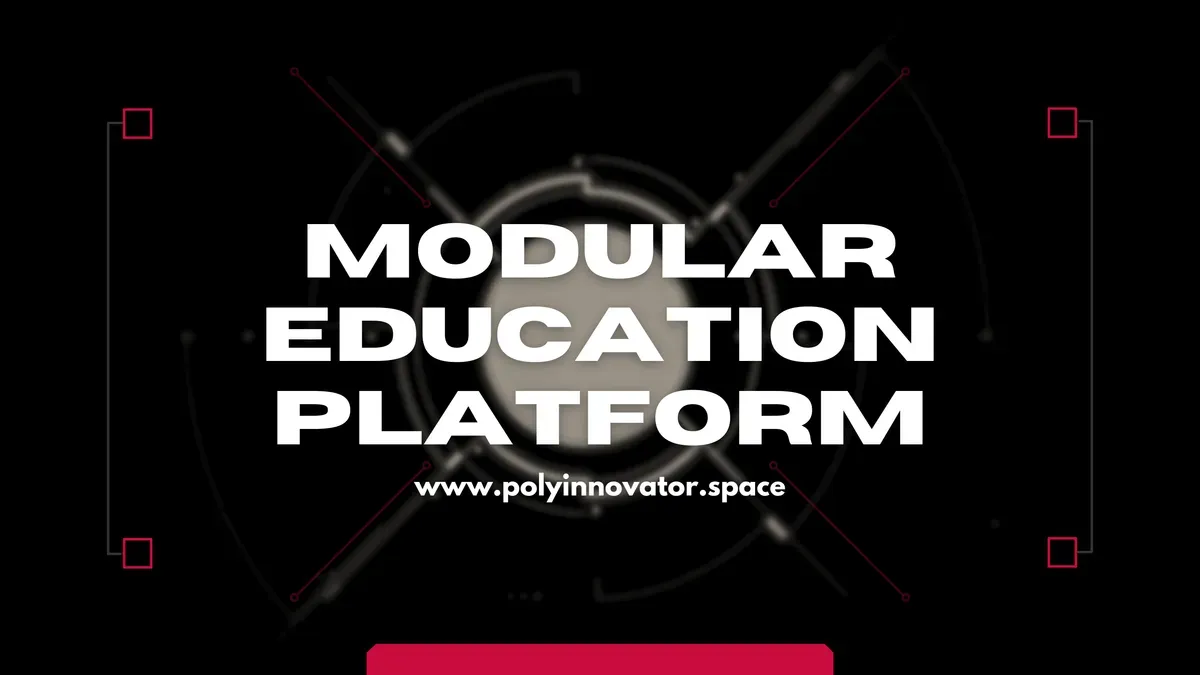Welcome to a new age of learning!
When I started PolyInnovator it was in the hopes that I could build it around this concept of a Modular Degree. A do it yourself endeavor for self-education. However over time it grew to be more than that, and the idea of Modular Education started to grow.
The potential of the Mod Degree is great, but the exponential potential of the Modular Education Framework is far more vast. Think about it in the idea of choice, YOU as the student chooses what to learn next, or with the help of AI/DigiMentors they can help guide you where to next. Depending on the situation, and the more important aspect behind this all is the learning materials.
In this framework the courses, degrees, and overarching goals all are Modular. Perfect for lifelong learning, and even for schooling as well. Maximizing a students attention, as well as gaining more competency to boot.
Hello I’m Dustin, Creator of the M.E.P.
This is something that I felt could revolutionize education as a whole, and how we approached learning. Especially in this modern digital internet landscape. From the rise of MOOC’s, Edu YouTube Channels, and even Podcasting; There is a plethora of online resources that can be learned from, but they aren’t made for traditional education. Let us take them, put them into a Modular Degree, and then on top of that see what else we can create on the course side of things.
A concept I took from video games is Skill Tree Based Learning, which is an approach that allows the learner in a course to direct which pathway within the course to go onto next. Sort of like a branching skill tree in a video game.
My mission is to help build a revolutionary new way of approaching learning, education, and growth.
-Dustin M. PolyInnovator
What is the MEP?
From skill tree based course modules, to the grand lifelong ambitions of a person, this framework encompasses the micro and macro. Combining the long separated aspects of someone’s educational part of life. Where school tries to separate themselves from your hobbies, as well as displaces your own curiosities and interests.
With the whole system being modular you can choose what you learn next, that power of choice not only allows for a higher interest level, meaning you will dedicate yourself a lot more to actually finished. Also the choice gives way for the opportunity to get into the state of FLOW, meaning the hypofrontality of the pre-frontal cortex, or optimal state of focus. #INTHEZONE
The Modular Education Framework is different from the Modular Degree in the sense that instead of focusing on someone trying to start their career, or pivot their career, as the Mod Degree is currently aimed for; The framework can be worked into people of all ages, from children to long lived adults.
It is meant to incorporate not only lifelong learning, but take into account things like spaced repetition, interleaving, and FLOW to optimize the learning process.
The Modular Degree is within the umbrella of the Framework, and one aspect that I have been digging into more and more over the past year is community based learned. With MOOC’s having discussion boards, plus perhaps video pods every once in a while. It doesn’t truly incorporate the social function in learning. Something that Hanna Celina, Director of Insights at FutureLearn, brought to my attention and made a solid point on. She is working on how to bring people together more in learning with peers. A point she made that really sparked a bulb, was the prospect of using existing platforms such as Twitter or socials as tools for discussion.
For example I was a part of bootcamp from Mirasee, where they used Slack to incorporate pods of people together.
Using the idea of a Modular Degree, and even breaking that down into something that could shared; Such as a mind map of courses. Each person generating their own contextual value in their learning. Then being able to share that with another person, and even DigiMentors could come in and share their own with learners. If a peer is following a similar Mod Degree, or even the same because you had shared yours, they could help study with you. Even if you are both going down a different skill tree branch, there could be some unique overlap that you would miss by not discussing.
This leads into boundless new opportunities. A Modular Learning Experience, with modular social interactions, as well as modular innovations coming forth from it all.
" Modular education partitions degrees into smaller, Lego-like building blocks of learning, each with their own credentials, learning and skills outcomes. This kind of modular content will benefit students and employees by allowing them to tailor their education background to better position them for job prospects and career mobility. "
-Anant AgarwalCEO and Founder of Edx.org
A couple of great links from Anant:
Stackable, Modular Learning – Edx Blog
How Modular Education Is Revolutionizing The Way We Learn
What the Platform Entails
It is still too early stage to offer much more than just the Modegree itself as a template on Notion/Airtable/etc. However what I am envisioning is that of a whole new way of approaching how we learn online.
The point of it is choice, and inherently we have a lack of that in current education systems. Even in college you are still squandering your first two years with general education, which is often super useful...yes, but could be approached in a more integrated manner.
For example in secondary school in some places in Europe, they approach some specialty classes with an interdisciplinary mindset. Think learning biology, but from the standpoint of civil engineering. Medical field, but from the perspective of a philosopher. This crossdisciplinary training allows for novel ideas to form, and in the long run a better chance at dual discipline innovations.
Something that on PolyInnovator has been talked a lot about! Especially on the PolyCast.
Mechanics
Currenly most learning management systems focus on a linear path, you want this skill? Then you through these modules in this order, in this course, then the next course. There is no choice, no chance for flow, and with boredom comes a complete lack of progression.
With skill trees it breaks up the monotany, with the courses and the modules themselves being split up into paths and micro paths.
An example I love to use on other podcasts when explaining is this:
Think of it like you're trying to build a house. You need to know electrical wiring, carpentry, plumbing, and blueprints. Four things to accomplish that goal of building a house, but who said you need to learn any one of those things first? Well over time people assumed that blueprinting is the way to go, get a macro view. However some people may be more inclined towards electric or plumbing, and if that sparks their interest then it is far more powerful. You start down that path, either finish it, or once you hit a roadblock there are two options. One, you push through it and gain discipline. Or two, maybe it is pure boredom not laziness, and so you switch to another track. Keeping the progression going.
-Dustin M. PolyInnovator
In either case you are allowed to have choice, and when you pursue something you're more interested in there is a higher chance of getting into the state of flow. With these micro tracks too it can help for interleaving, spaced repetition, and engagement. Which the latter is very crucial, as many platforms like Edx and Coursera have been having issues with engagement for their entire existence.
The question always remained, how do we get students to actually do the courses?
At this point in time it is being designed, ideated, and discussed. Legalities formulating, as well as getting the software planned out.
At this point in time I would suggest taking the Self-Edu mini course so that you can get a start on how to learn on your own (it will take time to get the AI or digimentors into the tool). As well as, soon as of Jan 2021 I am aiming to get Modegree templates out for various tools (so you can use the one you like), to get an idea for how to make your own Modular Degree.
![Official Website for Dustin Miller PolyInnovator [LLC]](https://www.polyinnovator.space/content/images/2025/03/polyinnovator-logo-2024.png)











